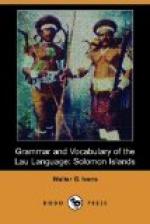9. Reduplication: Verbs are reduplicated in two ways: (a) by reduplication of the first syllable: liu, liliu; bae, babae; (b) by repetition of the whole word: gwou, gwougwou. There is no difference between the various forms beyond an intensification in meaning. In the vocabulary the reduplicated form is presented under the entry of the stem.
ADVERBS.
There are pure adverbs in Lau, but many words used as adverbs are truly nouns and others are verbs; adjectives may also occur in this employment.
1. Adverbs of place: mai here, hither; go there, thither, ne may be added, gone, also langi go, no. Lo there, is compounded with go and gi, logo north, west; se here, a noun, i se, isena, here, in this place, gula place, a noun: si gula na this place, here, gula i maa outside. bali side, a noun, bali ne here, on this side; i bali jordan i bali logo on the far side of Jordan; ifai where, gamu mai ifai whence are you? tau, a verb, far off: alaa up, south, east, ilangi, ifafo, up.
2. Adverbs of time: kada na (ne), manga na, now; si manga, kademanga, when, i kademanga na (ne), at the time when; i angita, si manga uta, when? inao of old, in the past; ua mai inao from of old; isingana ne henceforth: alua fasi, taraina, presently; urii just now; lau, lau go_, again; oli back; na, ua na, already; ua yet, still, still left; ua go i uarodo while still dark in the early morning; ua mai ana lua from the flood, toongi ua inao old clothes, e langi ua not yet, still wanting; firi, tefou, always; too ka tau forever; suli dangifiri daily; taraina to-day; i rogi yesterday; maaedangi i fafo day before yesterday; bobongi to-morrow; taraina lao rodo to-night; talae first; loulou quick; aliali forthwith; maasia, kade manga, while.
3. Adverbs of manner: alafana as, like, as if; uri, uria, sae, saea, that (of quotation); uri, urina, thus; e uta how? gele somewhat; asia completely, too much; saumala granted that; falaete, mamaloni, only; ooni merely; talai for no reason; tefou together; afui altogether (precedes verb); boro, oto, otomone, tamone, bota ana, perhaps; mone gives life, ba gives force, to the narrative; ba also explains and makes the diction less abrupt; tasa, tasaana, too much; faoroa often.




